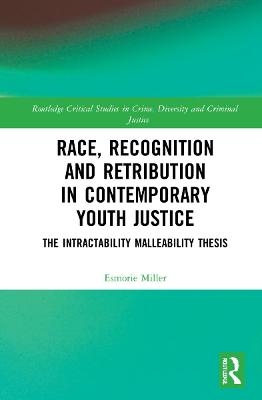
Race, Recognition and Retribution in Contemporary Youth Justice
Routledge (Verlag)
978-1-138-48879-3 (ISBN)
Race, Recognition and Retribution in Contemporary Youth Justice provides a cross-national, sociohistorical investigation of the legacy of racial discrimination, which informs contemporary youth justice practice in Canada and England. The book links racial disparities in youth justice, especially exclusion from ideologies of care and notions of future citizenship, with historical practices of exclusion.
Despite the logic of care found in both rehabilitative and retributive forms of youth justice, Black inner-city youth remain excluded from lenience and social welfare considerations. This exclusion reflects a historical legacy of racial discrimination apparent in the harsher sanctions levied against Black, innercity youth. In exploring race’s role in this arrangement, the book asks: To what extent were Black youth excluded from historic considerations of the lenience and social care, built into the logic of youth justice in England and Canada? To what extent are the disproportionately high incarceration rates, for Black, inner-city youth in the contemporary system, a reflection of a historic exclusion from considerations of lenience and social care? How might contemporary justice efforts be reoriented to explicitly prioritize considerations of lenience and social care ahead of penalty for Black, inner-city youth?
Examining the entrenched structural continuities of racial discrimination, the book draws on archival and interview data, with interviewees including professionals who work with inner-city youth. In concert with the archival and interview data, the book offers the intractability/malleability I/M thesis, an integrated social theoretical logic with the capacity to expand the customary analytical scope for understanding the contemporary entrenched normalization of racialized youth as punishable. The aim is to advance a historicized account, exploring youth’s positioning as constitutive of a continuity of racialized peoples’, in general, and youth’s, in particular, historic exclusion from the benefits of modern rights, including lenience and care. The I/M logic takes its analytical currency from a combined critical race theory (CRT) and recognition theory. The book argues that a truly progressive era of youth justice necessitates cultivating policy and practice which explicitly prioritizes considerations of lenience and social care, ahead of reliance on penalty.
This multidisciplinary book is valuable reading for academics and students researching criminology, sociology, politics, anthropology, critical race studies, and history. It will also appeal to practitioners in the field of youth justice, policymakers, and third-sector organizations.
Esmorie Miller’s research historicizes the role of race, racism, and racialization in contemporary youth justice (YJ). Where race in contemporary youth justice is concerned, specifically with the amplification of punishment, her research explores realities beyond crime and punishment; it explores punitive outcomes apparent in contemporary YJ, for racialized youth, as continuities of the historic exclusion of racialized peoples from the benefits of modern, universal rights. Retributive justice has, thus far, decoupled racialized youth’s contemporary concerns from this relevant history. A contemporary example of this is the institutional policies and practices around urban youth gangs, in England and Canada. Her research observes that, in both these contexts, race remains invisible in historic narratives on early modern youth penal reform, and thereby in the statutory approaches to gangs. Yet, race is an important part of these histories. Esmorie Miller is a lecturer in Criminology at London South Bank University.
Introduction: race, recognition and retribution in contemporary youth justice, in England and Canada
1. The intractability/malleability (I/M) thesis: On the historic construction of Black, racialized youth as intractably deviant outsiders
2. Youth justice (YJ) through a historical lens: on the invention of the intractable deviant Black, racialized youth
3. What’s it all about Jose? the invention of Black, racialized youth as intractably deviant outsiders, in the English context
4. Educating Glovanna: legislating intractability and the seeds of Black, racialized youth outsider status, in the historic Canadian education framework
5. Taking stock of contemporary youth justice: ‘the alchemy of race and rights’ in the epoch of punishment
6. Intractability, disproportionate incarceration, and the self-fulfilling risk policy framework: the case of the racialized youth gang
7. The wider punitive effect of racialization: the informal (retributive) gaze in contemporary youth justice
8. Conclusion: the I/M logic and moving beyond crime and punsihment
| Erscheinungsdatum | 04.01.2022 |
|---|---|
| Reihe/Serie | Routledge Critical Studies in Crime, Diversity and Criminal Justice |
| Verlagsort | London |
| Sprache | englisch |
| Maße | 156 x 234 mm |
| Gewicht | 412 g |
| Themenwelt | Sachbuch/Ratgeber ► Gesundheit / Leben / Psychologie |
| Recht / Steuern ► EU / Internationales Recht | |
| Recht / Steuern ► Strafrecht ► Besonderes Strafrecht | |
| Recht / Steuern ► Strafrecht ► Kriminologie | |
| Sozialwissenschaften ► Ethnologie | |
| Sozialwissenschaften ► Soziologie | |
| ISBN-10 | 1-138-48879-8 / 1138488798 |
| ISBN-13 | 978-1-138-48879-3 / 9781138488793 |
| Zustand | Neuware |
| Haben Sie eine Frage zum Produkt? |
aus dem Bereich


